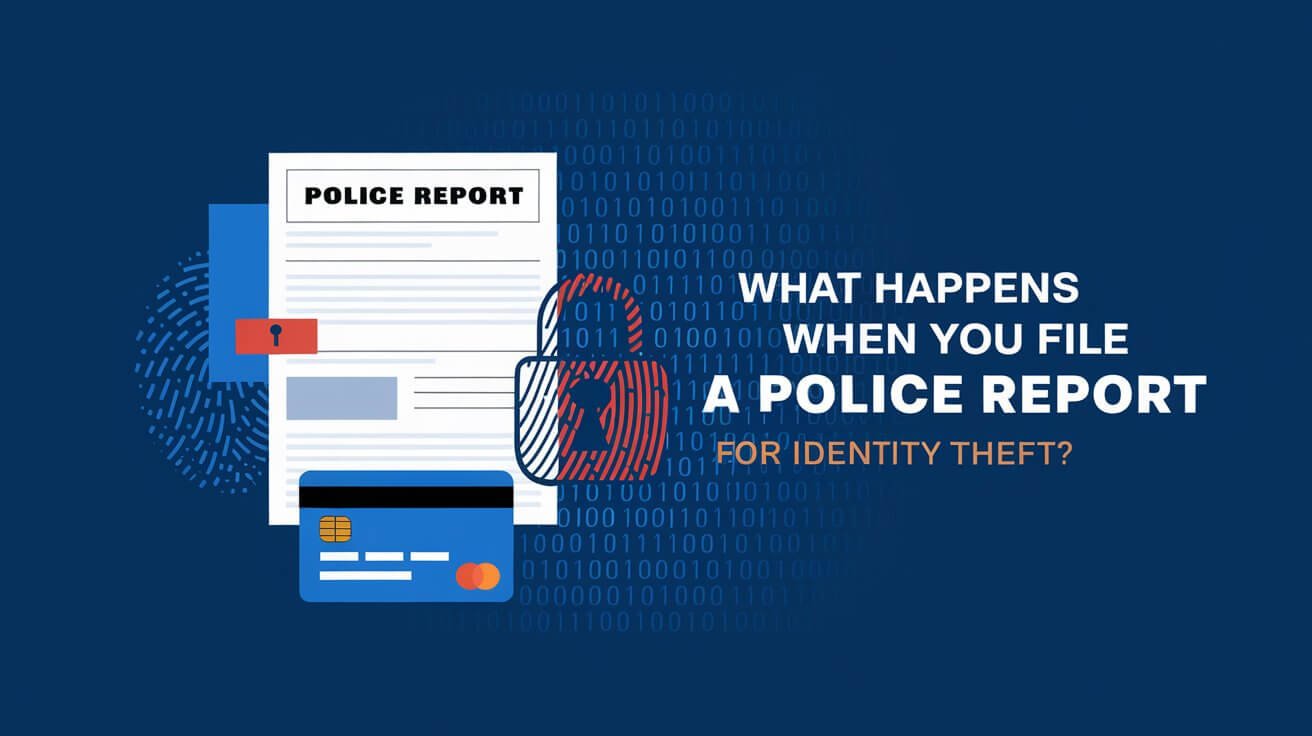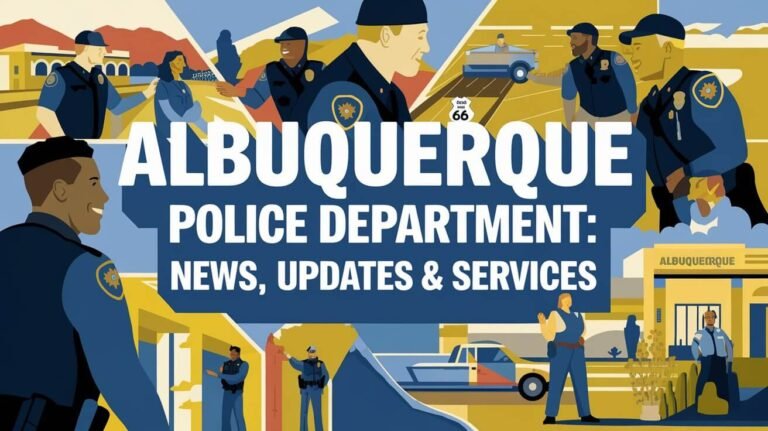What Happens When You File A Police Report For Identity Theft?

Filing a police report is key for identity theft victims in the U.S. It officially documents the crime and may start an investigation. This report is also needed when disputing fake charges or accounts opened in your name. But, not all police departments investigate identity theft, mainly if it’s online or across different areas.
To get the best results, victims should collect important documents. This includes the Federal Trade Commission (FTC) identity theft report and any proof of the fraud. Giving a detailed account of the crime helps the police take action quickly to help you.
Time-Sensitive Steps Before Filing a Police Report
If you think you’ve been a victim of identity theft, act fast. Before you file a police report, there are important steps to take. These steps help protect you and gather the right documents.
Gathering Essential Documentation
First, collect evidence of the identity theft. This includes your government-issued photo ID and proof of address. Also, gather any documents that show fraud happened. This evidence is key for a good investigation and to support your case.
Contacting Financial Institutions
Next, contact the financial places affected by the theft. This includes banks, credit card companies, and utility providers. Tell them about the theft and ask them to freeze or close any bad accounts. This stops more trouble.
Creating an FTC Identity Theft Report
Then, go to IdentityTheft.gov. This is the Federal Trade Commission’s (FTC) site for identity theft victims. Here, you can make an FTC Identity Theft Report. It gives you a recovery plan and is often needed before you file a local report.
Doing these steps, you’re ready to file a detailed police report. This is the first step to getting back on track after identity theft.
Required Documents for Filing an Identity Theft Report
To file a police report for identity theft, you need certain documents. These help prove who you are and show that a crime was committed. Here are the key documents you’ll need:
- A government-issued photo ID, such as a driver’s license or passport, to establish the victim’s identity.
- Proof of address, such as utility bills or credit card statements, to corroborate the victim’s personal information.
- Evidence of fraud, including bank statements, credit card statements, or other records that demonstrate suspicious account activities or unauthorized transactions.
- An FTC Identity Theft Affidavit, a standardized form that details the identity theft incident and helps law enforcement agencies investigate the case.
These documents are crucial. They help prove who you are and that fraud happened. This lets police start a deep investigation into the theft.
| Document | Purpose |
|---|---|
| Government-issued photo ID | Verifies the victim’s identity |
| Proof of address | Corroborates the victim’s personal information |
| Evidence of fraud | Provides concrete proof of the identity theft incident |
| FTC Identity Theft Affidavit | Standardized form that details the identity theft incident |
Collecting these important documents, victims can file a police report. This is the first step to dealing with the aftermath of identity theft.
What Happens When You File A Police Report For Identity Theft
When you file a police report for identity theft, the investigation starts. The police look at the evidence you give them. This can include things like unauthorized charges or credit report inquiries.
They might also talk to banks and other financial places. This helps them learn more and maybe catch the person who stole your identity.
Police Department Actions
The police’s actions can change based on the case and their resources. Sometimes, they really dig into the case. Other times, they might not, if it’s an online crime or across different areas.
It’s key to give the police all the details you can. This helps them do their job better.
Timeline of Investigation
- The time it takes to solve an identity theft case can vary a lot. It depends on how complex the case is and the police’s resources.
- Studies show that quick action and detailed information can help solve the case faster.
- Keeping in touch with the officer and checking on the case often can speed things up, the FTC says.
Even though the police might not always solve the case, filing a report is very important. It starts the investigation and proves the crime happened.
| Timeline of Identity Theft Investigation | Percentage of Cases |
|---|---|
| Immediate Investigation and Resolution | 25% |
| Investigation Ongoing for 1-3 Months | 40% |
| Investigation Ongoing for 3-6 Months | 20% |
| Investigation Ongoing for More Than 6 Months | 15% |
“Swift action is crucial following identity theft to mitigate potential damages to personal accounts and financial well-being.”
Rights and Protections as an Identity Theft Victim
If you’ve been a victim of identity theft, you have rights under federal law. These rights help protect your financial health. You can place free fraud alerts on your credit reports and get free copies of your credit reports. You also have the right to block fraudulent information from your credit files.
Victims of identity theft can get a report from the Federal Trade Commission (FTC) and their local police. This report is key to proving your case to creditors and financial institutions. It helps protect your rights.
- Federal law limits your liability to $50 for unauthorized charges to your credit card account.
- You have the right to remove or “block” fraudulent information from your credit files.
- Credit bureaus must honor your request to block fraudulent information if supported by an identity theft report.
- You are entitled to receive a free copy of your credit report as an identity theft victim.
- You can place a security freeze on your credit file for free with an identity theft affidavit or police report.
If your Social Security number has been used fraudulently, contact the Social Security Administration (SSA) at 1-800-269-0271. For stolen checks, report the fraud to Telecheck at 1-800-710-9898 or NPC at 1-800-526-5380.
Dealing with identity theft can be tough. But knowing your rights and the laws that protect you can help. It empowers you to act quickly and protect your financial health.
Credit Bureau Notification Protocols
After you file a police report for identity theft, telling the credit bureaus is key. You can protect your credit and stop more fraud.
Setting Up Fraud Alerts
Victims can put a free fraud alert on their credit reports for a year. This makes creditors check your identity before opening new accounts. For identity theft, this alert can last up to seven years.
Credit Freeze Implementation
Another step is to freeze your credit. This stops new accounts from being made in your name. You can freeze your credit for free with Experian, Transunion, and Equifax, thanks to federal law.
Credit Report Monitoring
Watching your credit reports regularly is important. It helps you spot any odd activity fast. This is key to fixing your credit and getting back to financial health after a breach.
| Credit Bureau Action | Duration | Key Benefit |
|---|---|---|
| Initial Fraud Alert | 1 year | Requires creditors to verify identity before issuing credit |
| Extended Fraud Alert | 7 years | Provides longer-term protection for identity theft victims |
| Credit Freeze | Indefinite | Blocks access to credit reports without permission, preventing new account openings |
Criminal Investigation Procedures for Identity Theft Cases
When someone’s identity is stolen, the first step is usually filing a police report. This action starts a series of steps that law enforcement takes to solve the crime.
The Federal Trade Commission (FTC) is key in these investigations. They get complaints and add victim info to a big database. This helps police and prosecutors to tackle these crimes better.
Victims should take action by putting fraud alerts on their credit reports. They should also close any accounts opened by thieves and make new ones secure.
Going to the local police to report identity theft is very important. Most cases are handled locally. Victims need to bring a printed ID Theft Complaint form and any supporting documents.
Police then collect info from victims, banks, and other places to solve the case. They might make arrests if they find enough evidence. But, 75% of cases might not get solved.
Working together, police, banks, and credit agencies can help victims. They can find and catch the thief, helping victims get their lives back.
Financial Institution Response After Police Report Filing
When a police report is filed for identity theft, banks start their own detailed investigations. They check transactions, freeze accounts, and refund any fake charges. To start the recovery, banks ask for the police report and the FTC Identity Theft Affidavit.
Bank Investigation Process
With the right paperwork, banks dive deep into the identity theft case. They look at account activity, check transactions, and watch for anything odd. Their aim is to find the fake transactions and protect the victim’s money.
Account Recovery Steps
- Closing the affected accounts to prevent additional fraudulent activities
- Issuing new account numbers, debit/credit cards, and checks to the victim
- Restoring the victim’s account balance by reversing any fraudulent charges
- Monitoring the accounts for suspicious activity and alerting the victim
- Providing ongoing support and guidance throughout the account recovery process
| Financial Institution Protocols | Bank Fraud Investigation | Account Recovery Procedures |
|---|---|---|
| Comprehensive review of transactions | Thorough analysis of account activity | Closing compromised accounts |
| Freezing affected accounts | Verifying suspicious transactions | Issuing new account numbers and cards |
| Refunding fraudulent charges | Identifying the extent of identity theft | Restoring account balances |
| Requiring police report and FTC affidavit | Mitigating further financial harm | Ongoing monitoring and support |
Legal Options Beyond Police Reports
Filing a police report is a key first step against identity theft. But, victims have more legal options. They can sue the thief, work with the Federal Trade Commission (FTC), or file complaints with state Attorney Generals.
Civil litigation is a legal way to fight back. It lets victims sue the thief to get back lost money and damages. But, this path is complex and slow. It often needs a lawyer who knows identity theft law well.
- The FTC’s Consumer Sentinel Network Databook reported over 1.4 million cases of identity theft in 2021, a significant increase from 650,000 cases in 2019.
- Javelin Strategy and Research estimated that identity fraud cost consumers approximately $56 billion in 2020, showcasing the substantial financial impact of such crimes.
- Proofpoint data indicates that 33% of Americans have experienced identity theft at some point in their lives, underscoring the prevalence of this issue in the United States.
Victims can also file a complaint with their state’s Attorney General. This can lead to investigations and legal actions against the thief. The FTC offers help, including a way to dispute unauthorized charges and accounts.
Working with a lawyer who knows identity theft law can be helpful. They can guide victims through the legal process. They help understand rights, explore legal options, and aid in recovery.
Recovery Timeline and Expected Outcomes
The journey to recover from identity theft is long and hard. Timelines vary based on the fraud’s extent. But, by acting fast and using long-term protection, victims can take back control and protect their finances.
Short-term Recovery Steps
In the early stages, the goal is to quickly stop the fraud and prevent more harm. This means setting fraud alerts with the three major credit bureaus and freezing credit reports. Also, watch all financial accounts for odd transactions.
Victims should talk to their banks, report the theft, and ask to close fake accounts. This helps stop the fraud right away.
Long-term Protection Measures
Recovering from identity theft is a long-term effort that needs constant attention. After the initial steps, victims should focus on long-term safety. This includes checking credit reports often, using credit monitoring services, and changing passwords for all online accounts.
Also, shredding sensitive documents and being careful with personal info can help avoid future theft. These steps are key to keeping your identity safe.
Frequently Asked Questions
What happens when you file a police report for identity theft?
Filing a police report for identity theft is a key step in recovering from fraud. You need to contact local law enforcement and provide an FTC identity theft report. You also need to show evidence of the crime.
This process officially documents the incident. It may also be needed by financial institutions to dispute fraudulent charges or accounts. But, not all police departments investigate identity theft cases, mainly if they happen online or across different areas.
What should I do before filing a police report for identity theft?
Before filing a police report, gather important documents. These include your government-issued photo ID, proof of address, and evidence of fraud. It’s also key to contact affected financial institutions to report the theft and freeze accounts.
Creating an FTC Identity Theft Report at IdentityTheft.gov is a must. It gives you a personal recovery plan and is often needed by police departments before you file a local report.
What documents are required to file a police report for identity theft?
To file an identity theft report, you need specific documents. These include a government-issued photo ID, proof of address, and evidence of fraud. You also need an FTC Identity Theft Report.
These documents help prove your identity and show the crime to law enforcement agencies.
What happens after I file a police report for identity theft?
After filing a police report, the department might start an investigation. They will review the evidence you provided. They might also contact financial institutions and try to find the perpetrator.
The time it takes for an investigation can vary. It depends on the case’s complexity and the resources available. In some cases, police might not investigate, like for online crimes or those across different areas.
What rights do identity theft victims have?
Identity theft victims have certain rights under federal law. They can place free fraud alerts on their credit reports. They also get free copies of their credit reports and can have fraudulent information blocked.
Victims also have the right to an identity theft report from the FTC and local police. This report can help when dealing with creditors and financial institutions.
How do I notify credit bureaus after filing a police report for identity theft?
Notifying credit bureaus is important after filing a police report. You can place a free one-year fraud alert on your credit reports. This makes creditors take extra steps to verify your identity.
Putting a credit freeze prevents new accounts from being opened in your name. Regularly checking your credit reports helps spot any suspicious activity quickly.
How do criminal investigations for identity theft cases work?
Criminal investigations for identity theft involve looking at evidence and tracking financial transactions. Law enforcement might work with cybercrime units and financial institutions to gather information.
In cases of online theft, the FBI’s Internet Crime Complaint Center (IC3) might be involved. They analyze and share information with other agencies.
What happens when financial institutions investigate after a police report is filed?
After a police report is filed, financial institutions will investigate. They review transactions, freeze accounts, and might refund fraudulent charges. Banks need the police report and FTC affidavit to start account recovery steps.
This can include closing compromised accounts and issuing new cards or account numbers.
What other legal options do identity theft victims have?
Identity theft victims have more legal options beyond filing police reports. They can sue the perpetrator if known, work with the Federal Trade Commission for consumer protection, and file complaints with state Attorney General offices.
In some cases, victims might need to work with legal professionals who specialize in identity theft cases to take further action.
What is the recovery timeline for identity theft victims?
The recovery timeline for identity theft varies greatly. Short-term steps include freezing accounts and fraud alerts. Long-term steps involve ongoing credit monitoring, regular password changes, and being more careful with personal information.
Complete recovery can take months or even years. It requires ongoing follow-ups with creditors, financial institutions, and credit bureaus.






